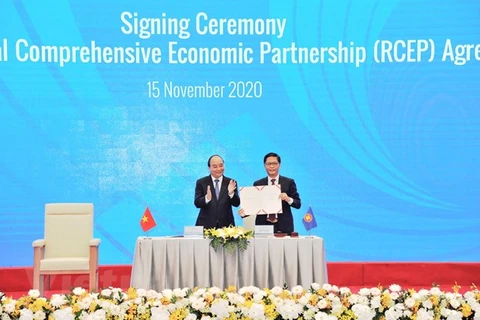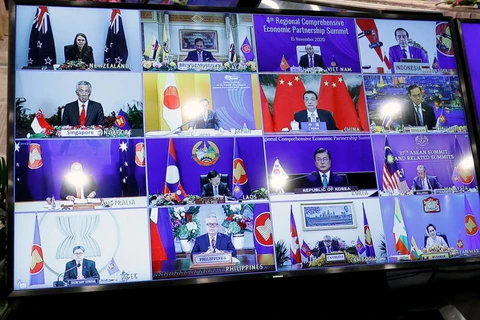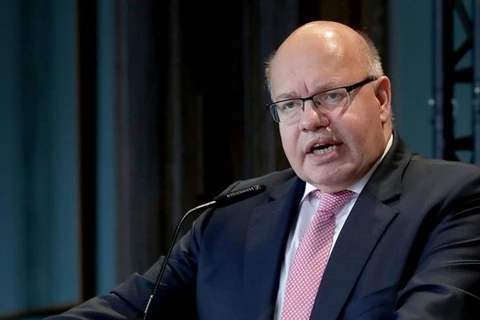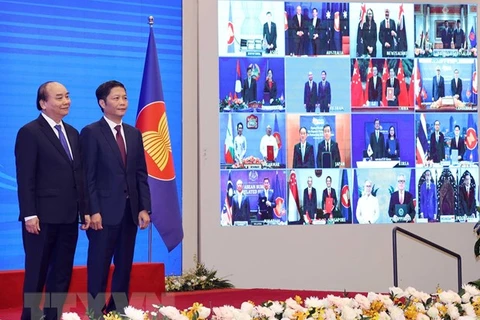 Vietnamese Prime Minister Nguyen Xuan Phuc (L) and Minister of Industry and Trade Tran Tuan Anh, together with leaders of other RCEP member countries, witness the pact signing via videoconference on November 15 (Photo: VNA)
Vietnamese Prime Minister Nguyen Xuan Phuc (L) and Minister of Industry and Trade Tran Tuan Anh, together with leaders of other RCEP member countries, witness the pact signing via videoconference on November 15 (Photo: VNA) Phnom Penh (VNA) – The signing of the Regional Comprehensive Economic Partnership (RCEP) agreement is a boon for not only Asia, but also the rest of the world, Cambodian academics said.
Mey Kalyan, senior advisor to the Supreme National Economic Council, said the agreement is important when global economy is losing out its balance due to the pandemic, protectionism and unilateralism.
"At the time when COVID-19 is still threatening our lives in the region and in the world, signing this RCEP is one of the epoch-making events in Asia, which will have good impact not only in Asia, but also in the world," he was quoted in a story by Xinhua News Agency published by the Khmer Times on November 18.
Kalyan, who is also chairman of the Cambodia Development Resource Institute, said the agreement would provide a long-term benefit to all participating countries including Cambodia.
Meanwhile, Neak Chandarith, director of the Cambodia 21st Century Maritime Silk Road Research Centre, said the RCEP is more liberalized than ASEAN 1 FTAs and the WTO's most-favored-nation (MFN) commitments.
For Cambodia, the trade agreement is the first-ever trade deal that enables the kingdom to enjoy an almost-free market access to a combined market. Once the pact takes effect, Cambodia’s trade in goods will increase and the country will welcome more investment inflows.
Cambodia expects that the agreement will promotes its bargaining power in other bilateral FTAs with RCEP and non-RCEP members, he added.
Chandarith said the RCEP would promote trade and attract investments to all participants in ASEAN indeed, but the extent to which each participant could enjoy varies.
Joseph Matthews, senior professor at the BELTEI International University in Phnom Penh, said the mega trade deal would definitely play an important and positive role in promoting trade and investment in Asia-Pacific countries and helping boost global economic confidence.
He stressed the RCEP would be a major force shaping the development of the world's economy in the post-COVID-19 era.
Leaders of 15 RCEP participating countries signed the long-awaited free trade agreement (FTA) at the fourth RCEP summit on November 15 in the framework of the 37th ASEAN virtual summit.
Initiated by the Association of Southeast Asian Nations (ASEAN) in 2012, the RCEP is a mega-trade pact between its 10 member states (Brunei, Cambodia, Indonesia, Laos, Malaysia, Myanmar, the Philippines, Singapore, Thailand and Vietnam) and its FTA partners, namely China, Japan, the Republic of Korea, Australia, and New Zealand.
The RCEP deal upon ratification will be the largest trade agreement in the world, creating a market of 2.2 billion people (approximately 30 percent of the world’s population), with a GDP of close to 26.2 trillion USD representing about 28 percent of the world trade, based on 2019 data./.
VNA























